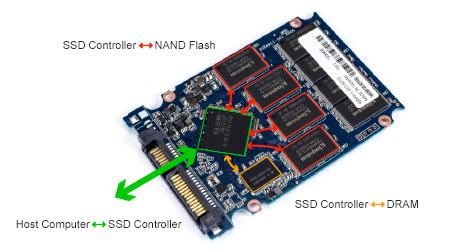Error Detection and Correction
SSDs must maintain data integrity as data moves from the host PC to the NAND storage via the SSD controller. The data transfers from the host to the SSD are often referred to as “data in flight” or “data in transit” before they are actually written to the NAND Flash storage. SSD controllers incorporate Error Correction technology (called ECC for Error Correction Code) to detect and correct the vast majority of errors that can affect data along this trajectory. Flash memory chips incorporate additional error correction information along with every block of data that is written; this information allows the SSD controller to simultaneously correct many errors when reading a data block. NAND Flash memory, like hard disk drives, encounters bit errors during normal operation and corrects such errors on the fly using its ECC data.
In rare cases, data errors in a block that is being read cannot be corrected; the SSD Controller recognises this occurrence as an Uncorrectable ECC Error (UECC) and reports the error to the host computer. SSDs are designed to be extremely reliable. For Client SSDs, UECCs are typically rated as one in 10
-15 bits read, and enterprise SSDs are rated as one in 10-16 bits read. Using the JEDEC JEDS218A and JESD219 UBER requirement for enterprise versus client SSDs, an enterprise class SSD is expected to experience only 1 unrecoverable bit error at a ratio of 1 bit error for every 10 quadrillion bits (~1.11 petabytes) compared to a client SSD at 1 bit error for every 1 quadrillion bits (~0.11 petabytes) read.
Kingston SSDs also incorporate Spare Blocks in the NAND Flash devices. These storage areas are usually in the Over-Provisioned (OP) space of a drive, and are not user-accessible. If a NAND device has excessive errors in a data block, then that block will be marked as a Bad Block, retired and one of the spare blocks will be rotated into service. During this process, the data will be corrected if needed using ECC. The use of Spare Blocks extends the useful life and endurance of SSD drives.

